- Home
- Gail Carriger
Blameless pp-3 Page 5
Blameless pp-3 Read online
Page 5
“Cables and guide rails allow the chamber to move up and down between levels, like so.” Madame Lefoux pulled a cord on one side of the cage. She continued explaining to Tunstell as the contraption dropped downward, raising her voice above the din that accompanied movement. “Above us is a steam-powered windlass. Do not worry; it is perfectly capable of sustaining our weight and lowering us at a respectable speed.”
So it proved to be the case as, with many ominous puffs of steam floating into the cage and some creaking and groaning that made Tunstell jump, they moved down. Madame Lefoux’s definition of a respectable speed might be questioned, however, as the contraption plummeted quickly, bumping when it hit the ground, causing everyone to stumble violently up against one side.
“At some point, I suppose I shall have to get around to fixing that.” The Frenchwoman gave an embarrassed little smile, showing small dimples. Straightening her cravat and top hat, she led the three men out. The passageway they walked into was lit by neither gas lamps nor candles, but instead by an orange-tinted gas that glowed faintly as it traveled through glass tubing set in one side of the ceiling. It was carried by an air current of some kind. The gas swirled constantly, resulting in patchy illumination and a shifting orange glow.
“Oooh,” commented Tunstell, and then, rather unguardedly, “What’s that?”
“Aetheromagnetic currents with a gaseous electromagnetic illuminatory crystalline particulate in suspension. I was interested, until recently, in devising a portable version, but, if not precisely regulated, the gas has a tendency to, well, explode.”
Tunstell didn’t miss a beat. “Ah, some questions are best left unasked, I take it?” He gave the tubing a wary look and moved to walk on the opposite side of the passageway.
“Probably wise,” agreed Professor Lyall.
Madame Lefoux gave a half shrug. “You did ask, no?” She led them through a door at the end of the passage and into her contrivance chamber.
Professor Lyall sensed that there was something different about the place. He could not determine exactly what it was. He was familiar with the laboratory, having visited it in order to acquire various necessary instruments, gadgets, and devices for the pack, for the Bureau of Unnatural Registry (BUR), and sometimes for his own personal use. Madame Lefoux was generally thought to be one of the better young members of the mad-scientist set. She had a reputation for good, hard work and fair prices, her only idiosyncrasy of consequence, so far, being her mode of dress. All members of the Order of the Brass Octopus were notorious for their eccentricities, and Madame Lefoux stood comparatively low on the peculiarity scale. Of course, there was always the possibility she would go on to develop more offensive inclinations later. There were rumors, but, to date, Lyall had had no cause to complain. Her laboratory was everything that was to be expected from an inventor of her character and reputation—very large, very messy, and very, very interesting.
“Where is your son?” inquired Professor Lyall politely, looking around for Quesnel Lefoux’s mercurial little face.
“Boarding school.” The inventor dismissed her child with a faint headshake of disappointment. “He was becoming a liability, and then the muddle with Angelique last month made school the most logical choice. I anticipate his imminent expulsion.”
Professor Lyall nodded his understanding. Angelique, Quesnel’s biological mother and Alexia’s former lady’s maid, had been working undercover for a vampire hive when she fell to her death out of the window of an obscure castle in Scotland. Not that such information was common knowledge, nor likely to become so, but the hives were not above recrimination. Angelique had failed her masters, and Madame Lefoux had involved herself unnecessarily in the matter. It was probably safer for Quesnel to be out of town and away from society, but Professor Lyall had a soft spot for the little ragamuffin, and would miss seeing him around the place.
“Formerly Lefoux must be missing him.”
Madame Lefoux dimpled at that. “Oh, I doubt that. My aunt never did like children very much, even when she was a child.”
The ghost in question, Madame Lefoux’s dead aunt and fellow inventor, resided in the contrivance chamber and had been, until recently, responsible for Quesnel’s education—although, of course, not during the daytime.
Floote stood quietly while Professor Lyall and Madame Lefoux exchanged pleasantries. Tunstell did not. He began poking about the vast muddle, picking up containers and shaking them, examining the contents of large glass vials and winding up sets of gears. There were cords and wire coils draped over hat stands to investigate, vacuum tubes propped in umbrella stands to tip over, and large pieces of machinery to rap on experimentally.
“Do you think I should warn him off? Some of those are volatile.” Madame Lefoux crossed her arms, not particularly concerned.
Professor Lyall rolled his eyes. “Impossible pup.”
Floote went trailing after the curious Tunstell and began relieving him of his more dangerous distractions.
“I see there is a reason Lord Maccon never decided to bite him into metamorphosis.” Madame Lefoux watched the exchange with amusement.
“Aside from the fact that he ran away, got married, and left the pack?”
“Yes, aside from that.”
Tunstell paused to scoop up and put on a pair of glassicals as he walked. Since Madame Lefoux had entered the London market, the vision assistors were becoming ubiquitous. They were worn like spectacles but looked like the malformed offspring of a pair of binoculars and a set of opera glasses. More properly called “monocular cross-magnification lenses with spectra modifier attachments,” Alexia called them “glassicals,” and Professor Lyall was ashamed to admit even he had taken to referring to them as such. Tunstell blinked at them, one eyeball hideously magnified by the instrument.
“Very stylish,” commented Professor Lyall, who owned several pairs himself and was often to be seen wearing them in public.
Floote gave Professor Lyall a dirty look, removed the glassicals from Tunstell, and prodded him back to where Madame Lefoux leaned against a wall, arms and ankles crossed. Large diagrams drawn in black pencil on stiff yellow paper were haphazardly pinned behind her.
Professor Lyall finally realized what it was about the contrivance chamber that was so different from his last visit: it was quiet. Usually the laboratory was dominated by the hum of mechanicals in motion, steam puffing out of various orifices in little gasps and whistles, gears clanking, metal chains clicking, and valves squealing. Today everything was silent. Also, for all its messiness, the place had an air of being put away.
“Are you planning a trip, Madame Lefoux?”
The Frenchwoman looked at the Woolsey Beta. “That rather depends on what Alexia has summoned us together to discuss.”
“But it is a possibility?”
She nodded. “A probability at this juncture, if I know anything about Alexia.”
“Another reason to send Quesnel away to boarding school.”
“Just so.”
“You understand much of Lady Maccon’s character, for such a comparatively short acquaintance.”
“You were not with us in Scotland, Professor; it encouraged intimacy. In addition, I have made her a bit of a pet research venture.”
“Oh, have you, indeed?”
“Before Alexia arrives, I take it you all read the morning papers?” Madame Lefoux switched the subject, levered herself upright from the wall, and took up a peculiarly masculine stance: legs spread, like a boxer at White’s awaiting the first blow.
The men around her all nodded their affirmation.
“I am afraid they do not lie, for once. Alexia shows every sign of increasing, and we must presume that a physician has corroborated my initial diagnosis. Otherwise, Alexia would likely be back at Woolsey Castle, chewing Lord Maccon’s head off.”
“I never noticed any of the aforementioned signs,” protested Tunstell, who had also traveled to the north with Madame Lefoux and Lady Maccon.
&nb
sp; “Do you think said signs are generally something you’re likely to observe?”
Tunstell blushed red at that. “No. You are perfectly correct, of course; most assuredly not.”
“So are we agreed that the child is Lord Maccon’s?” Madame Lefoux clearly wanted to find out where everyone stood on the matter.
No one said anything. The inventor looked from one man to the next. First Floote, then Tunstell, and then Lyall nodded their assent.
“I assumed as much, or none of you would have acquiesced to her request for this clandestine meeting, however desperate her circumstances. Still, it is curious that none of you challenges Alexia’s veracity.” The Frenchwoman gave Professor Lyall a sharp look. “I am aware of my own reasons, but you, Professor Lyall, are Lord Maccon’s Beta. Yet you believe it is possible for a werewolf to father a child?”
Professor Lyall had known this moment would come. “It is not that I know the answer as to how. It is simply that I know someone else who believes that this is possible. Several someones, in fact. And they are usually correct in these matters.”
“They? They who?”
“The vampires.” Never comfortable being the center of attention, he nevertheless attempted to explain himself further as all eyes turned to him. “Before she left for Scotland, two vampires tried to kidnap Lady Maccon. While she was on board the dirigible, her journal was stolen and someone tried to poison her. Most of the other incidents up north after that can be placed in Angelique’s hands.” Professor Lyall nodded to Madame Lefoux. “But those three episodes could not have been the maid. I believe the Westminster Hive was responsible for the attempted kidnapping and the theft of the journal, probably under Lord Ambrose’s orders. It seems like Ambrose; he always was ham-handed with his espionage. The kidnappers, whom I intercepted, said they were under orders not to harm Lady Maccon, but simply intended to test her—probably for signs of pregnancy. I believe they stole the journal for the same reason—they wanted to see if she was recording anything about her condition. Of course, she herself had not yet realized, so they wouldn’t have learned anything. The poisoning, on the other hand…”
Lyall looked at Tunstell, who’d been the inadvertent victim of that bungled attempt at murder. Then he continued. “Westminster would wait for confirmation before taking any action so final, especially against the wife of an Alpha werewolf. But those who are outside hive bonds are not so reticent.”
“There are very few rove vampires with the kind of social irreverence and political clout needed to risk killing an Alpha werewolf’s wife.” Madame Lefoux spoke softly, frowning worriedly.
“One of them is Lord Akeldama,” said Lyall.
“He wouldn’t! Would he?” Tunstell was looking less like an actor and more like the semiresponsible claviger he’d once been.
Professor Lyall tipped his head noncommittally. “Do you remember? Formal complaints were filed with the Crown when Miss Alexia Tarabotti’s engagement to Lord Maccon was first printed in the papers. We brushed them off at the time as a matter of vampire etiquette, but I am beginning to think some vampire suspected something like this might occur.”
“And with the morning gossip rags printing what they did…” Tunstell looked even more worried.
“Precisely,” said Professor Lyall. “The vampires have had all their worst fears confirmed—Lady Maccon is pregnant. And while the rest of the world sees this as proof of an infidelity, the bloodsuckers would appear to believe her.”
Madame Lefoux’s forehead creased with worry. “So the hives, originally inclined toward nonviolence, have had their fears confirmed, and Alexia has lost the protection of the Woolsey Pack.”
Floote’s normally dispassionate face showed concern.
Professor Lyall nodded. “All the vampires now want her dead.”
CHAPTER FOUR
Tea and Insults
Lady Maccon was on her third piece of toast and her fourth pot of tea, entertaining herself by glaring at some young lady or another simply to evaluate the color of the blush that resulted. She was no closer to determining who might want her dead—there were just too many possibilities—but she had made some concrete decisions about her more immediate future. Not the least of these being that, without Lord Akeldama, her safest course of action was to leave London. The question was where? And did she have the necessary finances?
“Lady Maccon?”
Alexia blinked. Was someone actually talking to her? She looked up.
Lady Blingchester, a mannish-faced matron of the stout and square variety with curly gray hair and too-large teeth, stood frowning down at her. She was accompanied by her daughter, who shared much the same expression and teeth. Both of them were known for having decided opinions on matters of morality.
“Lady Maccon, how dare you show your face here? Taking tea in such an obvious manner with”—she paused—“an agitated hatbox for company. In a respectable establishment, frequented by honest, decent women of good character and social standing. Why, you should be ashamed! Ashamed to even walk among us.”
Alexia looked down at herself. “I believe I am sitting among you.”
“You should be at home, groveling at the feet of your husband, begging him to take you back.”
“Why, Lady Blingchester, what would you know about my husband’s feet?”
Lady Blingchester was not to be forestalled. “Or you should have hidden your shame from the world. Imagine dragging your poor family into the mire with you. Those lovely Loontwill girls. So sensible, with so much promise, so many prospects, and now your behavior has ruined them as well as yourself!”
“You couldn’t possibly be talking about my sisters, could you? They have been accused of many things, but never sense. I think they might find that rather insulting.”
Lady Blingchester leaned in close and lowered her voice to a hiss. “Why, you might have done them a favor by casting yourself into the Thames.”
Alexia whispered back, as if it were a dire secret, “I can swim, Lady Blingchester. Rather well, actually.”
This latest revelation apparently too shocking to tolerate, Lady Blingchester began to sputter in profound indignation.
Alexia nibbled her toast. “Oh, do shove off, Lady Bling. I was thinking some rather important thoughts before you interrupted me.”
The hatbox, rattling mildly against its confining cords throughout this conversation, gave a sudden enthusiastic upward lunge. Lady Blingchester squawked in alarm and seemed to feel this the last straw. She flounced away, followed by her daughter, but she paused and had some sharp words with the hostess before leaving.
“Blast,” said Alexia to the hatbox when the proprietress, looking determined, headed in her direction.
The hatbox ticked at her unhelpfully.
“Lady Maccon?”
Alexia sighed.
“You understand I must ask you to leave?”
“Yes. But tell me, is there a pawnshop in the vicinity?”
The woman blushed. “Yes, my lady, just down off Oxford Circus past Marlborough Bank.”
“Ah, good.” Lady Maccon stood, untied the hatbox, and gathered it up along with her reticule and parasol. All conversation quieted as she once again held everyone’s attention.
“Ladies,” said Alexia to the assembled faces. Then she made her way, with as much gravity as possible for a woman clutching an epileptic pink hatbox to her bosom, to the counter, where she paid her account. The door behind her did not close fast enough to cut off the excited squeals and babble that heralded her departure.
The road was now crowded enough for safety, but still Lady Maccon walked with unseemly haste down Regent Street and into a small pawnshop. There she sold all the jewelry she was currently wearing at a shockingly devalued rate, which nevertheless resulted in quite an obscene amount of money. Conall might be an untrusting muttonhead, a Scotsman, and a werewolf, but the man knew a thing or two about feminine fripperies. Mindful of her circumstances alone in the city, Alexia secreted the re
sulting pecuniary return in several of the hidden pockets of her parasol and proceeded furtively onward.
Professor Lyall looked at the French inventor with a cutting eye. “Why is Lady Maccon involving you in this matter, Madame Lefoux?”
“Alexia is my friend.”
“That does not explain your eagerness to be of assistance.”
“You haven’t had many friends, have you, Professor Lyall?”
The werewolf’s upper lip curled. “Are you certain friendship is all you want from her?”
Madame Lefoux bristled slightly. “That is a low blow, Professor. I hardly think it your business to question my motives.”
Professor Lyall did something quite unusual for him. He colored slightly. “I did not intend to imply… that is, I had not meant to insinuate…” He trailed off and then cleared his throat. “I planned to hint at your involvement with the Order of the Brass Octopus.”
Madame Lefoux rubbed the back of her neck in an unconscious gesture. Hidden under her short dark hair, just there, was a small octopus tattoo. “Ah. The Order has no direct involvement, so far as I can tell.”
Professor Lyall did not miss the implication of that phrasing. Madame Lefoux might literally be unable to tell of the OBO’s interests if she had been instructed to remain silent.
“But it is undoubtedly scientifically intrigued by Lady Maccon?” Professor Lyall pressed her.
“Of course! She is the only female preternatural to enter our sphere since the Order’s inception.”
“But the Hypocras Club—”
“The Hypocras Club was only one small branch, and their actions became sadly public. Quite the embarrassment, in the end.”
“So why are you such an eager friend?”
“I cannot deny a certain fascination with Alexia as a scientific curiosity, but my research, as you well know, tends to be more theoretical than biological.”
“So I was inadvertently closer to the mark initially?” Professor Lyall regarded Madame Lefoux with a wealth of understanding.
Madame Lefoux pursed her lips but did not deny the romantic insinuation. “So you will allow my motives to be, if not pure, at least in Alexia’s best interest? Certainly, I care more for her well-being than that rubbish husband of hers.”

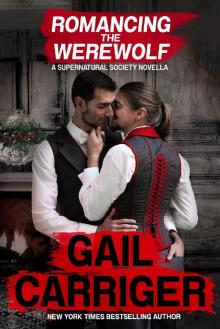 Romancing the Werewolf
Romancing the Werewolf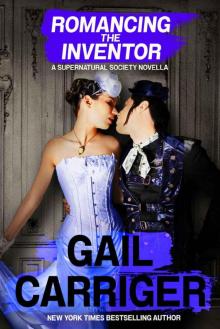 Romancing the Inventor
Romancing the Inventor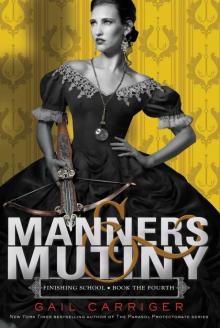 Manners & Mutiny
Manners & Mutiny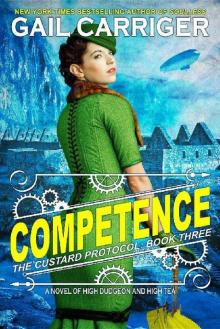 Competence
Competence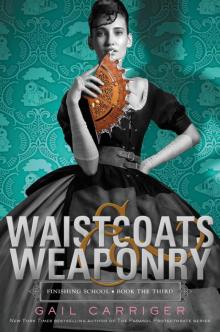 Waistcoats & Weaponry
Waistcoats & Weaponry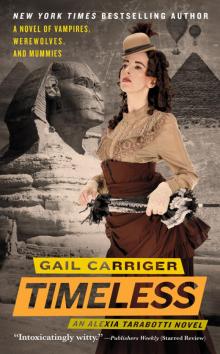 Changeless
Changeless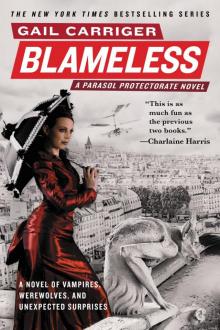 Blameless
Blameless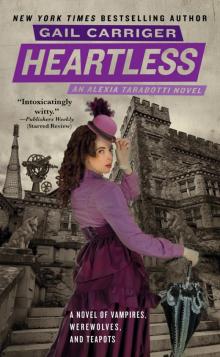 Soulless
Soulless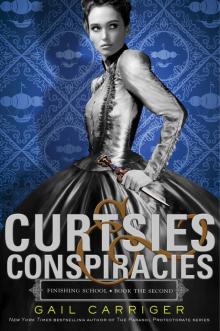 Curtsies & Conspiracies
Curtsies & Conspiracies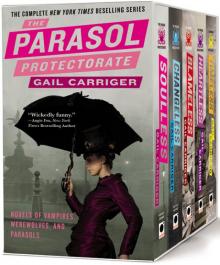 The Parasol Protectorate Boxed Set
The Parasol Protectorate Boxed Set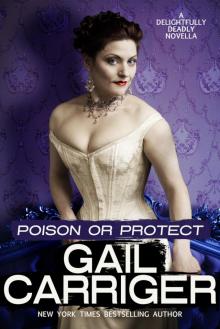 D2D_Poison or Protect
D2D_Poison or Protect Funny Fantasy
Funny Fantasy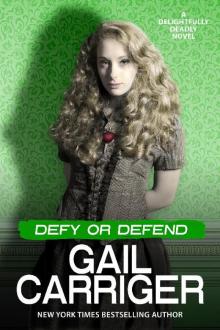 Defy or Defend
Defy or Defend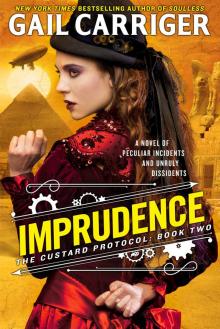 Imprudence
Imprudence Reticence
Reticence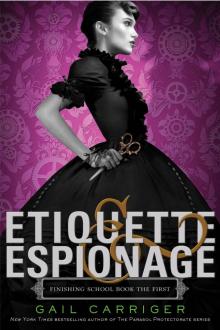 Etiquette & Espionage
Etiquette & Espionage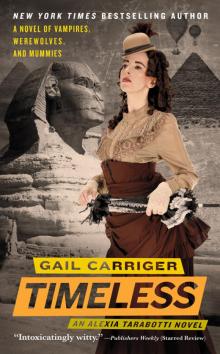 Heartless
Heartless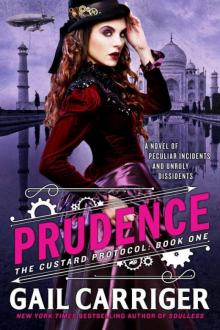 Prudence
Prudence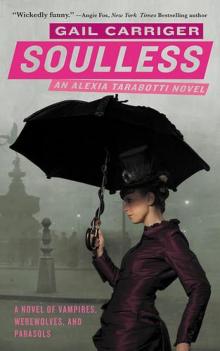 Parasol Protectorate 01 - Soulless
Parasol Protectorate 01 - Soulless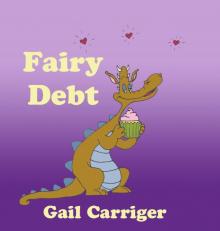 Fairy Debt
Fairy Debt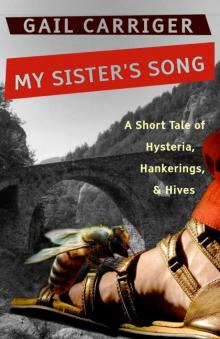 My Sister's Song
My Sister's Song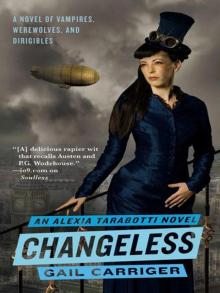 Changeless: The Parasol Protectorate: Book the Second
Changeless: The Parasol Protectorate: Book the Second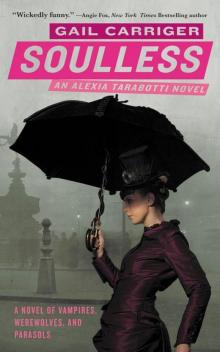 Soulless: The Parasol Protectorate: Book the First
Soulless: The Parasol Protectorate: Book the First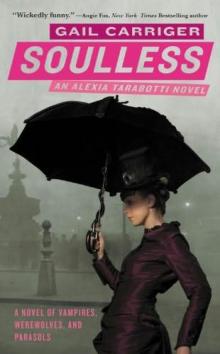 Soulless pp-1
Soulless pp-1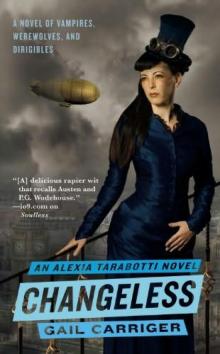 Changeless pp-2
Changeless pp-2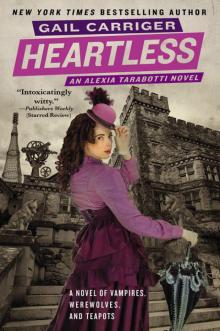 Heartless: The Parasol Protectorate: Book the Fourth
Heartless: The Parasol Protectorate: Book the Fourth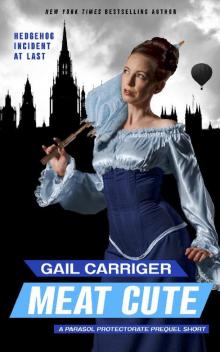 Meat Cute
Meat Cute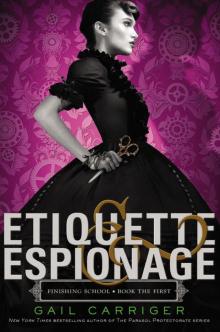 Etiquette & Espionage (Finishing School)
Etiquette & Espionage (Finishing School)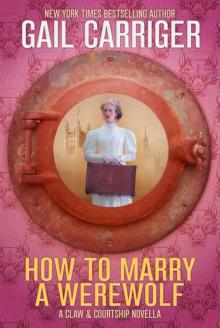 How To Marry A Werewolf (Claw & Courtship Novella Book 1)
How To Marry A Werewolf (Claw & Courtship Novella Book 1)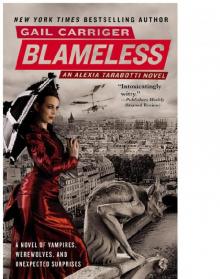 Blameless: The Parasol Protectorate: Book the Third
Blameless: The Parasol Protectorate: Book the Third Heartless pp-4
Heartless pp-4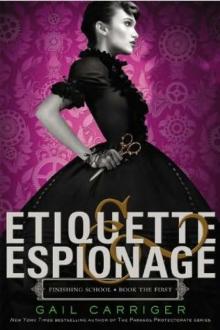 Etiquette & Espionage fs-1
Etiquette & Espionage fs-1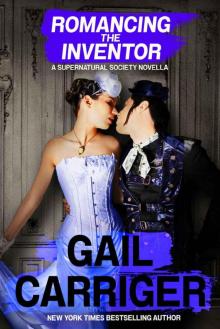 Romancing the Inventor: A Supernatural Society Novella
Romancing the Inventor: A Supernatural Society Novella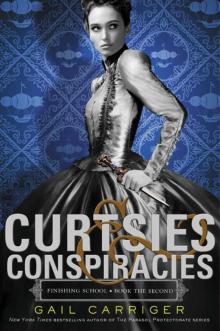 Curtsies & Conspiracies fs-2
Curtsies & Conspiracies fs-2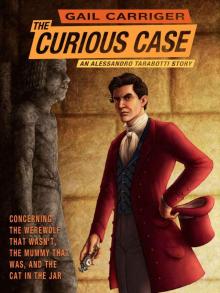 The Curious Case of the Werewolf That Wasn't, the Mummy That Was, and the Cat in the Jar (The Parasol Protectorate Book 6)
The Curious Case of the Werewolf That Wasn't, the Mummy That Was, and the Cat in the Jar (The Parasol Protectorate Book 6)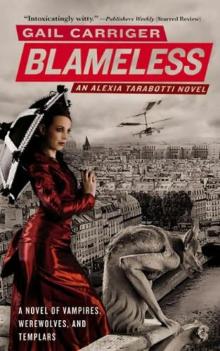 Blameless pp-3
Blameless pp-3